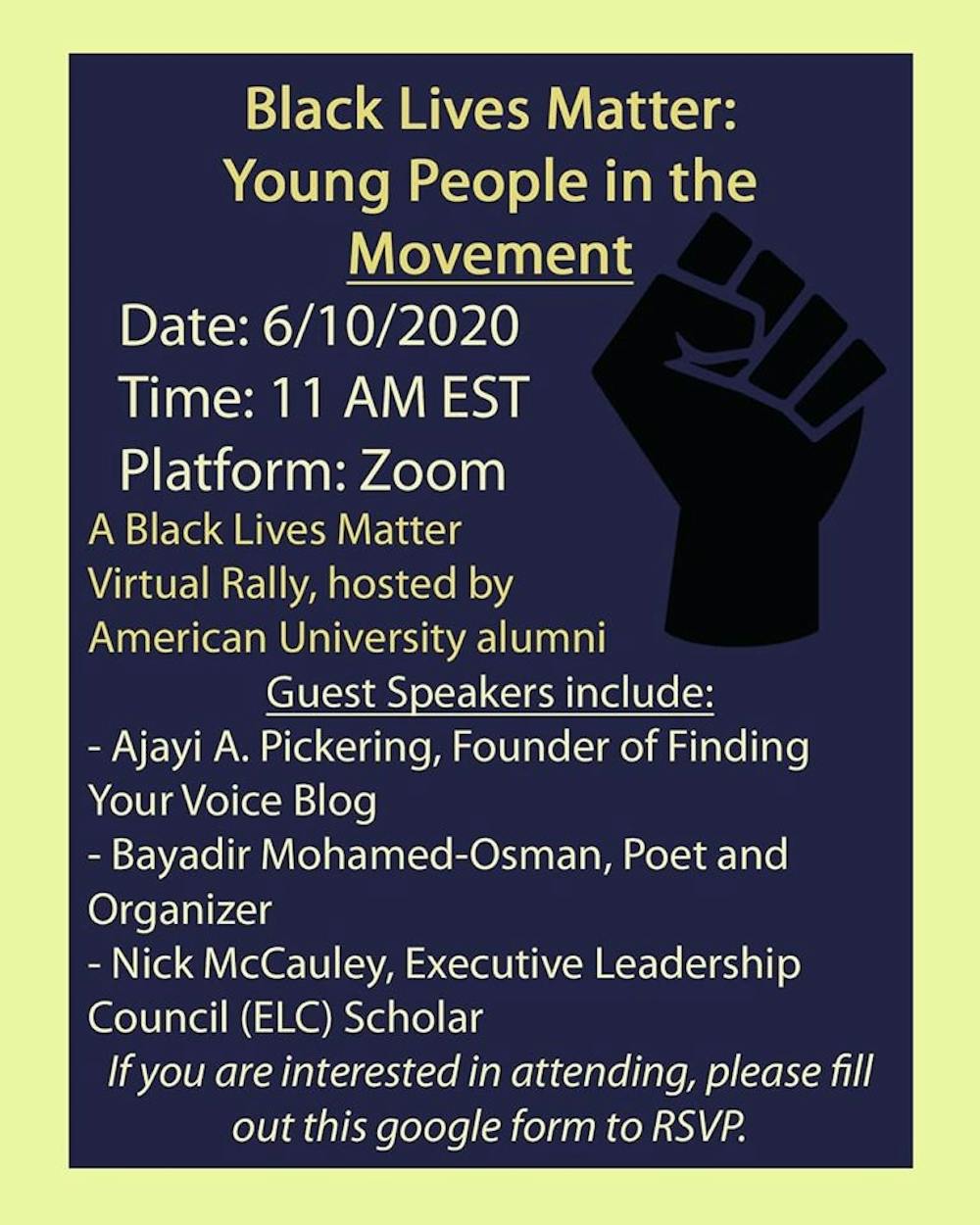Update: This article has been updated to include Ajayi Pickering-Haynes' hyphenated name.
American University alumni are coming together for a virtual Black Lives Matter: Young People in the Movement rally on Wednesday to accommodate those who are unable to attend in-person protests and provide tangible action steps on becoming involved in the movement.
Angelica Vega, who graduated from AU this spring, was inspired to create Young People in the Movement in May to uplift young voices in response to racism in the country. The decision to hold this rally virtually, though, was personal, and originated from her mother.
“My mom has a disability, and she is part of the high risk population where if contracted, COVID-19 would be really bad,” Vega said. “So, she told me that she wished that she could physically be there to protest because she lived a lifelong struggle against white supremacy and racism, and when she told me she felt powerless and voiceless, it really got me to start thinking that accessibility matters in movements because you don’t want anybody’s voice to be lost.”
Following her conversation with her mom, Vega began reaching out to her friends from AU to begin the formulation of a virtual rally, and thus sparked the development of Young People in the Movement.
Vega invited three AU alumni to speak at the rally: Nick McCauley, Ajayi Pickering-Haynes and Bayadir Mohamed-Osman. Each of them has been outspoken on racial inequality and injustice, and they hope that they can provide resources for young people to join and amplify the movement.
“In an in-person protest, you’re getting your voice heard, but you’re less likely to be heard than the virtual rally, where there is the opportunity to have dialogue with speakers and give people the opportunity to really voice their opinions,” McCauley said.
According to McCauley, social media is a primary tool that young people use to express their opinions and engage in dialogue.
“This is affecting everyone,” McCauley said. “The most effective thing to do is actively reach out on a personal level to people who don’t support it or just aren’t likely to have a conversation. Ultimately, that’s how change happens.”
Pickering-Haynes agreed that creating a dialogue through social media is important, but he said to be mindful of the type of content one chooses to post.
“Be conscious of the trauma that this can invoke on Black people and Black bodies,” Pickering-Haynes said. “I have been shying away from sharing anything that shows something too traumatic or too brutal, even if it's something that I can stomach and digest, because someone else on my social media might not be able to. My personal approach is to be informed and be conscious of other people’s mental health because this is hard for everyone, especially Black people, to see right now.”
The rally is primarily geared toward the AU community, and the organizers said they hope that they can inspire further change on campus in terms of safety for Black students and expansion of the curriculum on race.
Mohamed-Osman said that every year that she attended AU, there was a racist incident, and she advocates for the University to improve on how they respond to those incidents.
“AU needs to stand up and condemn these acts and incidents quickly, keep the process transparent, and hold everybody accountable for their actions, in terms of both professors and students,” Mohamed-Osman said. “Not just saying the words ‘diversity’ and ‘inclusion,’ — let’s talk about justice, let’s talk about reform, let’s talk about how to really build our community and how to provide resources for Black people on campus, more than just putting our pictures on the website.”
Vega echoed Mohamed-Osman’s sentiments and said that AU needs to do more to make Black students feel safe on campus, and she hopes that this rally can be a call to action.
“The biggest thing is that we want AU to hear us,” Vega said. “I can count tons of times when a racial incident happens on campus, or a national platform, and I’m both emotionally drained and tired, yet I always have to be the one to start that conversation in that class. I want [AU] to realize that when things happen, act upon it. Don’t wait.”
Vega, McCauley, Pickering-Haynes and Mohamed-Osman hope that people will walk away from this rally feeling empowered and ready to use their own voices to advance the goals of the Black Lives Matter movement.
“I want people to recognize the volume of their own voice, and I want people to feel committed to do the internal work,” Pickering-Haynes said. “It’s great if people donate money, it’s great if people show up to protests, but ultimately, if we’re not looking at our mind patterns and consciousness and really evaluating who we are and what we care about, then we’re not going to see any effective change.”





